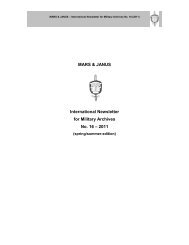National Experiences - British Commission for Military History
National Experiences - British Commission for Military History
National Experiences - British Commission for Military History
You also want an ePaper? Increase the reach of your titles
YUMPU automatically turns print PDFs into web optimized ePapers that Google loves.
tH e so u t H af r i C a n air fo r C e: Hi s t o r i C a l notes a n d in v o lv e m e n t in t H e ko r e a n wa r 277<br />
After North Korean invasion of South Korea, the South Korean and UN <strong>for</strong>ces were<br />
pushed down to the southern extremity of the peninsula. A brilliant UN offensive and<br />
the amphibious landings at Inchon, push the North Korean <strong>for</strong>ces the Chinese border<br />
in the north which resulted in a Chinese intervention. UN <strong>for</strong>ces were again <strong>for</strong>ced<br />
into a haphazard retreat south. By the end of June 1951, however, it seemed that the<br />
Communist <strong>for</strong>ces were ready to negotiate and that the UN objectives might be in<br />
sight. 22 What is however of interest is the preceding two months, the role of air power<br />
and the air offensive, together with the place of the SAAF’s 2 Squadron (2 Sqn) in<br />
these events. 2 Sqn was heavily engaged in the intense air war during this critical<br />
phase of the war, and South African pilots gained a <strong>for</strong>midable reputation <strong>for</strong> getting<br />
the job done, as one US officer stated: “We always gave them the dirty or tricky jobs<br />
that no one else wanted because we knew that they would handle them”. 23<br />
The Ground Situation<br />
The ground situation in the sixty-four days be<strong>for</strong>e 24 June 1951 can be divided<br />
into two periods: from 22 April to 19 May the UN <strong>for</strong>ces successfully resisted the<br />
“Fifth Phase Offensive” by combined Chinese and North Korean Forces; while from<br />
20 May to 24 June the UN <strong>for</strong>ces launched an offensive that achieved the stabilization<br />
of a Main Line of Resistance (MLR) - <strong>for</strong> the most part just north of the 38th parallel.<br />
This MLR was to remain virtually static until the end of the war (see Map 1).<br />
By 21 April 1951 the UN <strong>for</strong>ces had established themselves along the Utah and<br />
Kansas Phase lines after a successful offensive. 24 On 22 April 1951 the Communist<br />
Forces attacked the US I and IX Corps positions in strength in an attempt to recapture<br />
Seoul. 25 Although they did not achieve the objective, General Van Fleet, who<br />
took over from General Ridgway on 11 April (who succeeded General MacArthur),<br />
was <strong>for</strong>ced to withdraw to the No-name line by 30 April. 26 The Communist offensive<br />
halted and Van Fleet immediately replied with an offensive aimed at denying<br />
the enemy the opportunity to build-up <strong>for</strong> a new offensive, threatening their supply<br />
routes in the Hwachon area and the so-called ”Iron Triangle”. A policy of hot<br />
pursuit was proclaimed over the 38th parallel. 27 The UN advance achieved some<br />
success although it was slowed by rain on 27-28 May. The retreating enemy ground<br />
<strong>for</strong>ces, compelled to move during the day, was exposed to air attacks and by the end<br />
of May the UN <strong>for</strong>ces had re-established themselves along the Kansas line. They<br />
22<br />
J.W. Pratt, A <strong>History</strong> of United States Foreign Policy, second edition, Prentice Hall, Englewood<br />
Cliffs, 1965, p. 490.<br />
23<br />
H. Heitman, South African Armed Forces, p. 58.<br />
24<br />
J. Miller, O.J. Carroll & M.E. Tackley, Korea, 1951-1953, Office of the Chief of <strong>Military</strong> <strong>History</strong>,<br />
Washington (S.A.), pp. 20-27.<br />
25 Ibid., p. 103.<br />
26 Ibid., pp. 102-107.<br />
27 Ibid., p. 109.



